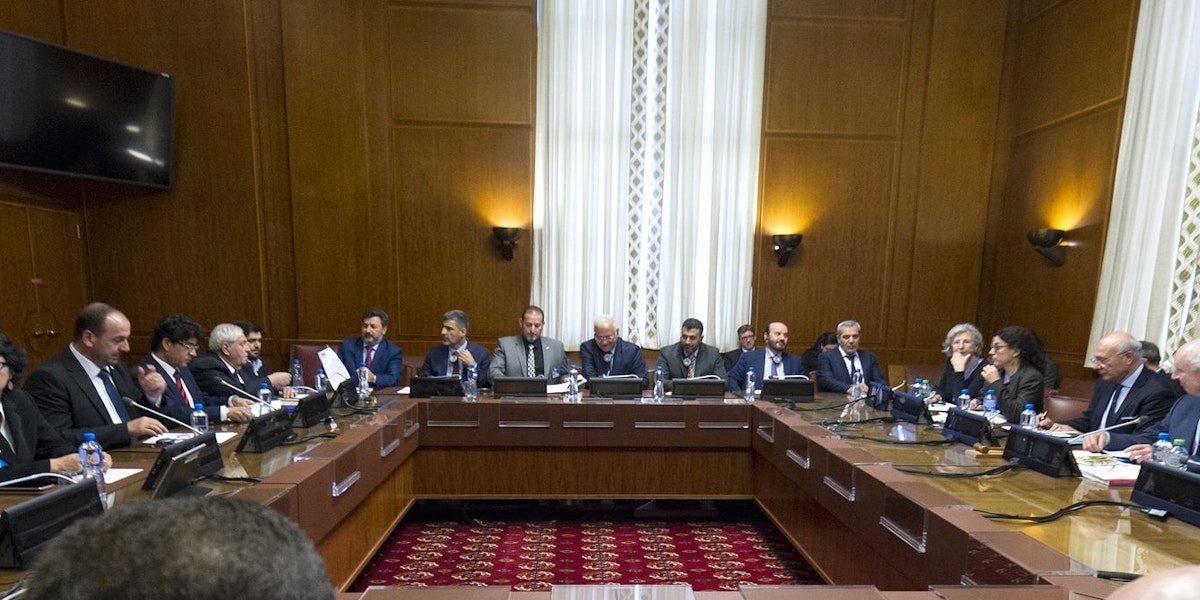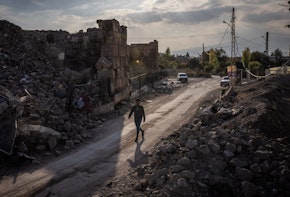World powers have been attempting to broker an end to Syria’s war nearly since the start of the conflict in 2011. Beginning in 2012, those efforts have mostly taken the shape of the “Geneva process,” including multiple rounds of indirect talks between the Syrian opposition and the regime of President Bashar al-Assad since 2014. Now, according to UN Special Envoy Staffan de Mistura, talks are slated to reconvene in Geneva, Switzerland, on July 10.1
Ahead of this latest negotiations round, the most pressing question seems to be: Why?
That is, why is the Geneva process still ongoing? The talks have made scant progress toward a negotiated resolution to the Syrian war and, by all appearances, no breakthrough is forthcoming. On the ground inside Syria, meanwhile, the regime and its allies have continued to drive toward the sort of total military victory that would obviate the need for a political solution of any sort.
In interviews, members of the opposition camp—including opposition negotiators and their Western state backers—as well as members of Syrian civil society told me there are specific rationales to keep attending Geneva, as well as for the continued existence of Geneva itself. For them, Geneva is a chance for smaller tactical wins and a vessel for a possible future deal. It’s also about keeping an internationally recognized political process shaped by key opposition backers, rather than ceding the negotiating space to the rival, “Astana” negotiations track, over which Russia has presided.2 And, to some extent, it’s a simple function of inertia and a limited bureaucratic imagination.
Geneva talks are not, however, a real chance to negotiate an end to the war. Geneva participants have reasons for attending, and there are gains to be made in Geneva—but they don’t include peace in Syria.
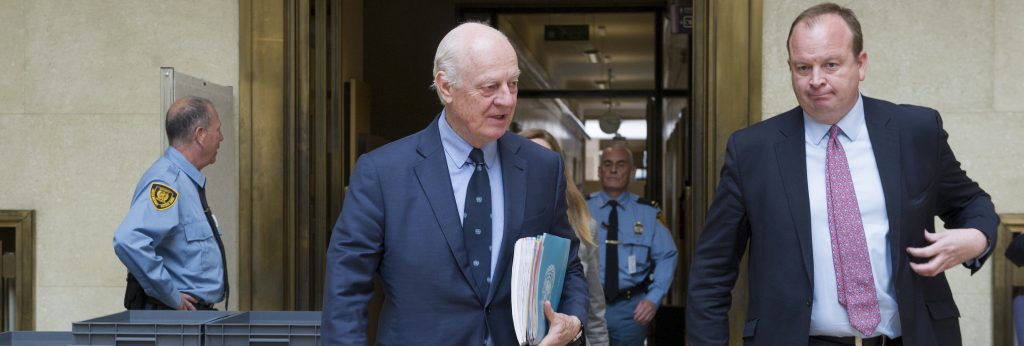
The Process
The Geneva framework dates back to the “Geneva Communiqué,” issued on June 30, 2012, by the United Nations and countries including the United States and Russia.3 The Communiqué called for the creation of a transitional governing body to preside over a Syrian-led political transition. Critically, the body was to be formed “on the basis of mutual consent,” which meant the Assad regime would have to approve its own negotiated demise.
The regime and opposition came together in January 2014 for “Geneva II” talks,4 then again several times in 2016 for “Geneva III,”5 held against the backdrop of a faltering nationwide “cessation of hostilities.”6 The current round of “Geneva IV” talks began in February 2017,7 spurred by fears that parallel negotiations in Kazakhstan’s capital Astana and sponsored by Russia, Iran, and Turkey might render Geneva irrelevant.
These latest talks, led by de Mistura, have centered on four sets of technical talks, or “baskets”: accountable governance, the constitution, elections, and counterterrorism and security governance. The baskets have been an attempt—mostly unsuccessful so far—to circumvent go-nowhere arguments over a transition.
Yet the Geneva process has never graduated beyond indirect talks, in which regime and opposition delegations meet with de Mistura’s team, not with each other. The regime delegation has remained reliably intransigent, refusing to entertain talk of any transition and preferring instead to question the legitimacy of opposition negotiators and call for international cooperation to crush the mixed insurgents it uniformly labels “terrorists.” Meanwhile, the opposition delegation has mostly insisted on a transition and the full implementation of relevant international resolutions—that is, the satisfaction of opposition demands that, arguably, amount to regime change.
“The basic point on the negotiations agenda needs to be the process of a political transition,” opposition negotiator George Sabra told me. “That’s what the Geneva I communique said in 2012, UN Security Council resolution 2118, and UN Security Council resolution 2254.”8
In the last round of talks, which concluded on May 19, de Mistura attempted to introduce a new “consultative mechanism” that ran into resistance from Syrian participants. The remaining time in Geneva was spent on technical meetings on Syria’s constitution.
“We talk about these detailed issues,” Sabra told me. “But these issues remain partial, ones that are resolved by linking them to the basic process, the process of political transition. Because if we don’t have a sincere intention to carry out a political transition, what does it mean to discuss the constitution? Or election laws? Even the issue of terrorism.”9
A Solution, at Some Point
Still, even if Geneva seems to be going nowhere, there are arguments for its continued existence—or for the existence of Geneva as it could be, not necessarily as it is. One of the main rationales for Geneva now, Western diplomats told me, is just to keep the process going. That way, the Geneva forum will be available if, at some unspecified future point, circumstances lend themselves to more meaningful negotiations. Alternately, a possible great-power deal could be brokered separately, then dropped whole into the Geneva format to give it a useful imprimatur of international legitimacy.
“We’re very clear-eyed about the advantages of Geneva,” said one Western diplomat who, like others, requested anonymity to speak freely. “We have no illusions that it’s going to lead to a peace treaty in the near term, or that the regime delegation will make significant concessions on the core issue of ceding executive authorities.
“But in the future, if conditions improve on the ground, if we can de-escalate the conflict, the political process increases in importance,” he said. “If we just let it die, if we let it wither on the vine, then it won’t be there when we need it.”10
“The Geneva process, in my mind, has always been about keeping a process going, waiting for some kind of political agreement taking shape that would enable real negotiations to happen,” said another Western diplomat.
“The conditions for real negotiations are not there, obviously,” he added.11
This rationale should not be unfamiliar to observers of the Israeli-Palestinian peace process, which has likewise been kept alive in a sort of liminal, zombie way.12
A meaningful political process would require a number of pieces to fall, implausibly, into place. Many opposition backers’ hopes hang on some American grand bargain with Russia, or a scenario in which Russia eventually realizes its regime client is incapable of stabilizing Syria and agrees to force a major structural change within the regime.
This seems unlikely, given Russian behavior to date, the apparent limits of Russia’s influence on the regime, and the even more unyielding position of Assad’s other main backer, Iran. Still, the thinking goes, it’s technically not impossible.
The Shadow of Astana
There is also the fear that, without Geneva, everything will become Astana.
Astana grew out of negotiations between armed opposition factions and Russia, facilitated by Turkey, to evacuate the last rebel-held neighborhoods of Aleppo city.13
Turkey, Iran, and Russia have jointly sponsored Astana talks, which began in December 2016. Astana was billed as a forum to broker ceasefires and other confidence-building measures whose partial or non-implementation had stymied Geneva. To that end, the Syrian opposition has been represented by delegates from armed rebel factions (with a civilian advisory element), while the regime has sent its standard Geneva negotiating team.
Yet Astana has seemed more like a forum for its three state sponsors to broker deals amongst themselves—frequently at the Syrian opposition’s expense—and that Syrian attendees can endorse after the fact. And although one Western diplomat dismissively called Astana “this Russian-Turkish-Iranian circus going on,”14 the process is viewed as one primarily shaped by Russia, towards Russian political-military ends.
Astana has repeatedly encroached on core political issues meant to be resolved in Geneva.
Astana has repeatedly encroached on core political issues meant to be resolved in Geneva. “When we got to Astana, we were surprised,” said Colonel Fateh Hassoun, commander of Homs rebel faction Harakat Tahrir al-Watan and a participant in both Astana and Geneva talks. “From day one, Russia didn’t focus just on a ceasefire. It proposed a constitution, it proposed elections. [Astana’s] an alternative to the Geneva track, for if Geneva doesn’t continue.”15
“If you don’t have a [Geneva] process and all you have is Astana, Astana is, at best, a token to calm the violence and pave the way for politics,” a Western diplomat told me. “Or at worst, it’s a botched job that, either carelessly or intentionally, breaks the country up.”16
Astana’s format and guest list should, in theory, lend themselves to specific, practical agreements and more functional coordination. So far results have been mixed, though: Astana has produced only partial ceasefires, and no headway on issues like humanitarian access to besieged areas.
And Astana has a qualitatively different feel than Geneva, one with which many Geneva attendees are uncomfortable. Geneva enjoys international political legitimacy and, interviewees told me, is based on principles they considered worthy and laudable. Astana skews more towards grubby deal-making, in a way that’s especially alarming for civilians mostly excluded from a forum for armed actors.
Maria Al Abdeh, head of Syrian NGO Women Now for Development, has participated in Geneva’s “Civil Society Support Room” and supported detainees’ rights group Families for Freedom in Geneva. She told me she preferred a UN-sponsored dialogue in Geneva, whatever its faults, to haggling between armed factions that all had dirty hands.
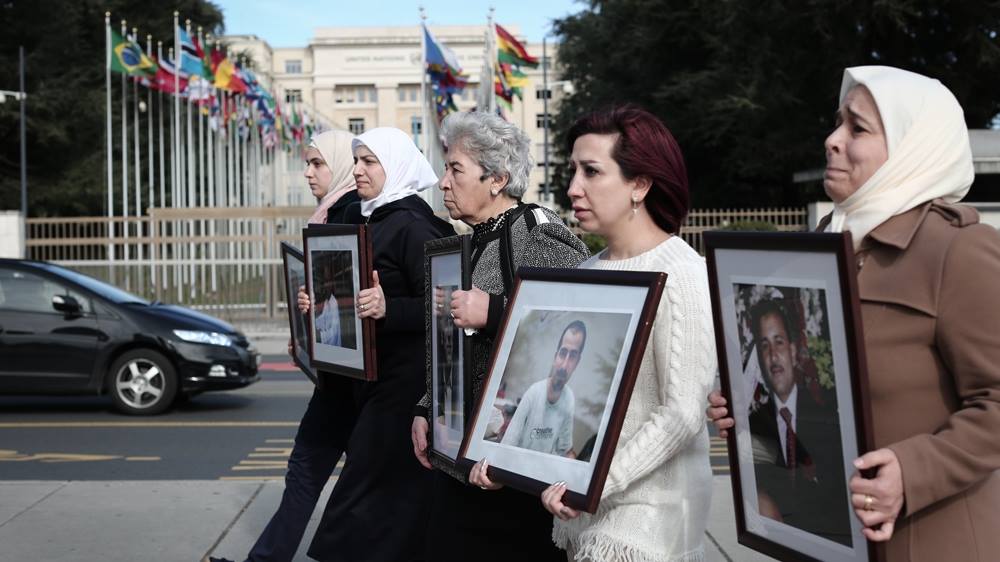
“We still have, at the political level [in Geneva], some people who are not involved in kidnapping or in related issues,” Abdeh said. “But in Astana, everybody, everybody is involved. Everybody has committed abduction and other stuff. So for sure, if the detainees issues went to Astana, we would just be talking about prisoners of war.”17
Small Victories
Geneva also provides an opening for more limited gains, below the threshold of a transition or an encompassing political agreement.
Geneva has been a useful platform for Syrian civil society, and for civilian voices that have otherwise been drowned out by the crash of the country’s war. The formal Geneva process has now incorporated the Civil Society Support Room, in which civil society representatives play a consultative role to Special Envoy de Mistura. Families for Freedom and other civil society actors have also used Geneva as an opportunity to bring their message to an audience of international media and diplomats.
“There was a big media presence, and we spoke clearly about what we wanted,” said Fadwa Mahmoud, an activist with Families for Freedom, wife and mother to two detainees, and herself a former detainee. “We also met with a group of a dozen international envoys there in Geneva. We gave them our demands, told them who we were and what we want. So we delivered our message to them, and they expressed a lot of solidarity with us.”18
Families for Freedom applied for visas to attend Astana, Mahmoud and Abdeh told me, but were denied.
In theory, Geneva is also an opportunity for the opposition to score tactical victories against the regime by outmaneuvering it diplomatically. This is what the opposition’s state backers have encouraged, pushing the opposition delegation to cooperate productively with de Mistura and, in doing so, somehow put the regime in a political corner.
“We can show it’s the regime that’s intransigent and doesn’t want a political solution,” said rebel commander and opposition negotiator Hassoun. “And show that Russia supports the regime, right or wrong—of course, there’s no ‘right’ with the regime.”19
Yet it’s not obvious how any of this translates into tangible results or what opposition members get from playing along, aside from not convincing their backers that they’re so hopelessly uncooperative that they should be discarded.
“What’s the point of embarrassing the regime in front of the international community if the Russians and the Iranians continue supporting it militarily on the ground, in a sharp change to the balance of power, and continue to support it politically in negotiations?” opposition negotiator Sabra asked me. “Embarrassing the regime is not a gain for us. We want to stop the squandering of Syrians’ blood, to stop this massacre. Embarrassing the regime doesn’t save the life of a Syrian child.”20
Embarrassing the regime doesn’t save the life of a Syrian child.
Geneva can also be a useful focal point for various regional and international actors, a center of gravity that keeps them from spinning off in dangerous unilateral directions or that provides a context into which players can situate other specific initiatives. The Geneva process provides a comprehensive national framework that, reassuringly, assuages fears of partition. That frees up various countries and Syrian actors to pursue sub-national de-escalations that actually hold some promise—in part because they reflect ground realities from which Geneva talks have grown increasingly disconnected.
The Geneva Imperative
Diplomatic sources told me that if Geneva didn’t exist, someone would probably create it, or something like it.
The sense was that Europeans in particular would regard a diplomatic vacuum on Syria as intolerable and reflexively attempt to fill it with a new, replacement process. (There seems to be no European appetite for buying into Astana, which is viewed as an unprincipled formalization of a Russian-sponsored regime victory.) The Syrian conflict is of huge strategic significance for Europe, which has been destabilized by massive refugee flows fueled in part by Syria. But Europe also has only a few, debatably useful policy implements, including peace diplomacy and prospective reconstruction assistance. There seems no way that European countries will surrender one of their only tools of leverage, or that European diplomats who recognize Geneva’s limitations could ever make the case for abandoning it to political leaders in their respective capitals.
“I’m pessimistic by nature, but it’s very difficult to argue that you should just admit this is not going well,” one diplomat told me.21
Opposition backers are also paralyzed by the absence of any alternative to Geneva—convinced that Syria’s current trajectory is unacceptable and dangerous, that something must be done, that Geneva is something, and therefore it must be done.22
“We firmly believe a frozen conflict or the breakup of the country is highly dangerous to Europe and highly dangerous to regional interests—stability, migration, terrorism, and so on,” one diplomat told me.23
“While the script for Geneva is not realistic at this moment,” another said, “nobody has proposed an alternative script that would allow an end to conflict, return of refugees, reconstruction, and conditions for fighting terrorism in the region and beyond.”24
The reality that there may be no script—Geneva or otherwise—that satisfies those key priorities seems difficult to comprehend and internalize.
Large sections of Western Syria strategy only make sense if some minimum-satisfactory political solution is on the way. The West’s counter-terrorism strategy in western Syria—as it is currently articulated—is for Western-backed, nationalist rebels now fighting alongside jihadists against the Assad regime to realign themselves with a new, post-Assad Syrian government and instead extirpate their former jihadist comrades.
If a Geneva-like solution is not forthcoming, none of this holds together.
Dim Prospects
There is little reason to expect Geneva to suddenly go better. The Syrian regime remains totally unbending. To date, no one has demonstrated that any combination of diplomatic or military pressure can make the regime more pliable, not on the core issues Geneva is meant to discuss. The assumption among the Syria diplomatic corps is that every time the regime sends chief negotiator Bashar Jaafari to Geneva (and to Astana), it is a signal of unseriousness. Jaafari is seen as having no mandate to make any concessions; instead, he is there to intimidate and agitate the less polished opposition delegation.
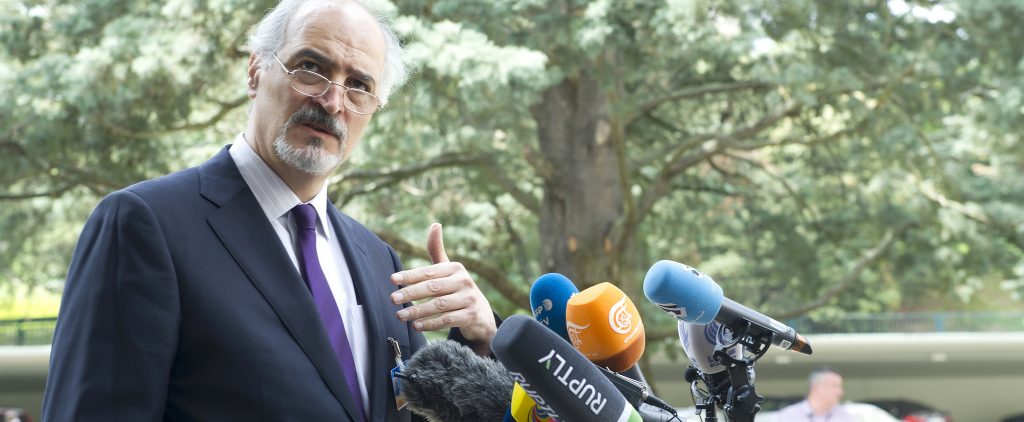
Meanwhile, the opposition delegation in Geneva is only debatably representative of the fragmented opposition inside Syria, and in particular of the armed opposition that would have to participate in a de-escalatory solution. The opposition—one bloc within the opposition delegation in particular—continues to insist on a regime change victory that does not reflect the actual balance of military power inside the country, and which the opposition’s international backers will not deliver.
“We want to continue Geneva, because maybe, just maybe there will be American and international will to bring down the regime,” negotiator Hassoun told me. “And then the Geneva process will become effective.”25
Yet many opposition backers seem less invested in the central Syrian conflict being litigated in Geneva than in the campaign against the self-proclaimed Islamic State, and in the Kurdish forces with which they have partnered in that fight. These Kurdish forces—which have never been represented in either Geneva and Astana—exist outside Geneva’s binary regime-opposition paradigm, a paradigm that now seems like a vestige of a bygone stage of the war.
At this point, a unifying regime-opposition political solution for Syria may not even be desirable. There now exists such an extreme asymmetry between the strength of the regime and the opposition that any possible settlement that joins the two likely means the mostly intact regime’s absorption of the opposition.
There is a reason why the opposition’s most basic demands have always equaled regime change. Opposition delegates in Geneva have no safe future inside a Syria ruled by a mostly or entirely un-reconstructed regime.
Opposition delegates in Geneva have no safe future inside a Syria ruled by a mostly or entirely un-reconstructed regime.
For that reason, Geneva is unlikely to be useful even as a legitimizing rubber stamp for an agreement negotiated in another forum. By now, any settlement within the realm of possibility will be unacceptable to a core of opposition representatives in Geneva. These delegates are already safely beyond the regime’s grasp. They have little reason not to obstruct a conditional surrender, or even a less ambitious de-escalation that departs from revolutionary demands.
It seems impossible for Geneva to go on like this forever. Eventually, it will presumably be so drained of momentum that it sort of fades away.
One more hard-nosed Western diplomat told me UN agencies are already planning for post-agreement projects in Syria. “It’s a question that’s so stupid to ask, no one is asking it—but, what agreement?” he asked. “There’s not going to be an agreement, not something like in Bosnia.”
“Probably what will happen is we’ll get to Geneva XII, it’ll be a huge joke, and de Mistura will resign,” he told me.26
But until then, Geneva is likely to continue, if only for reasons of inertia and political necessity.
In all, the most compelling—largely unspoken—argument for keeping on with Geneva seems to be: Why not?
For diplomats and Syrian negotiators, Geneva is a time-suck and a psychic burden. But, at the same time, it isn’t obviously hurting anyone or making things worse. And actively, deliberately killing the Geneva process seems as if it would be harder and more destructive than just continuing to attend.
In the meantime, the shape of a future Syria is being decided on the ground, inside the country. Geneva and its sponsors can keep trying new negotiating formats or conflict resolution tricks, attempting to halt Syria’s grim trajectory. But in real practice, the war is being resolved by mechanisms—brutal, martial ones—that have little to do with Geneva, or with the principles and institutions it represents.
Geneva can reconvene and adjourn, this month and again in future. The war, meanwhile, will go on.
Cover photo: OPPOSITION DELEGATION MEETS WITH UN SPECIAL ENVOY STAFFAN DE MISTURA. SOURCE: UNITED NATIONS.”
Notes
- Shadia Nasralla and Stephanie Nebehay, “U.N. mediator targets fresh Syria talks for July 10,” Reuters, June 17, 2017, http://www.reuters.com/article/us-mideast-crisis-syria-un-idUSKBN1980DP.
- Aron Lund, “Staring Into Syria’s Diplomatic Fog,” The Century Foundation, January 6, 2017, https://tcf.org/content/commentary/staring-syrias-diplomatic-fog/; Aron Lund, “Can a deal in Astana wind down the six-year Syrian war?” IRIN News, May 5, 2017, https://www.irinnews.org/analysis/2017/05/05/can-deal-astana-wind-down-six-year-syrian-war.
- “Action Group for Syria: Final Communiqué,” United Nations, June 30, 2012, https://www.un.org/News/dh/infocus/Syria/FinalCommuniqueActionGroupforSyria.pdf.
- Anne Barnard and Nick Cumming-Bruce, “After Second Round of Syria Talks, No Agreement Even on How to Negotiate,” New York Times, February 15, 2014, https://www.nytimes.com/2014/02/16/world/middleeast/after-second-round-of-syria-talks-no-agreement-even-on-how-to-negotiate.html.
- Aron Lund, “The Road to Geneva: the Who, When, and How of Syria’s Peace Talks,” Syria in Crisis, Carnegie Middle East Center, January 29, 2016, http://carnegie-mec.org/diwan/62631.
- Aron Lund, “Syria’s Cessation of Hostilities: How Does It Work and How are Factions Reacting?” Syria in Crisis, Carnegie Middle East Center, February 29, 2016, http://carnegie-mec.org/diwan/62916?lang=en.
- Aron Lund, “Everything you need to know about the latest Syria peace talks,” IRIN News, February 21, 2017, https://www.irinnews.org/analysis/2017/02/21/everything-you-need-know-about-latest-syria-peace-talks; Dylan Collins, “De Mistura: Syria talks in Geneva end with clear agenda,” Al Jazeera, March 3, 2017, http://www.aljazeera.com/news/2017/03/de-mistura-syria-talks-geneva-clear-agenda-170303202045570.html.
- George Sabra, interview with the author, phone call, June 2017.
- Ibid.
- Western diplomat, interview with the author, phone call, May 2017.
- Western diplomat, interview with the author, phone call, May 2017.
- For one recent argument for radical discontinuity in the Israeli-Palestinian peace process, see Diana Buttu, “Why the Palestinian Authority Should Be Shuttered,” New York Times, May 26, 2017, https://www.nytimes.com/2017/05/26/opinion/palestinian-authority-mahmoud-abbas.html.
- Sam Heller, “Aleppo’s Bitter Lessons,” The Century Foundation, January 27, 2017, https://tcf.org/content/report/aleppos-bitter-lessons/.
- Western diplomat, interview with the author, Beirut, Lebanon, May 2017.
- Col. Fateh Hassoun, interview with the author, phone call, May 2017.
- Western diplomat, interview with the author, phone call, May 2017.
- Maria Al Abdeh, interview with the author, phone call, June 2017.
- Fadwa Mahmoud, interview with the author, phone call, June 2017.
- Colonel Fateh Hassoun, May 2017.
- George Sabra, May 2017.
- Western diplomat, interview with the author, phone call, May 2017.
- Credit goes to Megan McArdle for the “something must be done” formulation. Megan McArdle, “There’s Little We Can Do to Prevent Another Massacre,” The Daily Beast, December 17, 2012, http://www.thedailybeast.com/theres-little-we-can-do-to-prevent-another-massacre.
- Western diplomat, interview with the author, phone call, May 2017.
- Western diplomat, interview with the author, phone call, May 2017.
- Colonel Fateh Hassoun, May 2017.
- Western diplomat, interview with the author, Beirut, Lebanon, May 2017.
